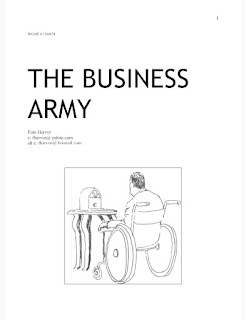Occasionally I post a link to a historical novel I had published at Eclectica Magazine: https://www.eclectica.org/v23n2/harvor.html
It’s entitled The Business Army, and it’s about a historically documented attempt to organize a coup d’état in the United States during the early months of Franklin Roosevelt’s presidency.
The novel exists in two forms: as a conventional manuscript and as a form of graphic novel I call the Highly Illustrated Screenplay Narrative (a mouthful, I know; I might rework the term).
I’ve decided to post a lot of the latter form of the novel. Graphic novels tend to be expanded comic books (I wrote/drew one many years ago, and know the degree of labour involved). Conventional novels, on the other hand, tend to be devoid of art, and also tend to hew to a rather traditional concept of how narrative should be produced. Yet at the same time, our mass culture has become acutely influenced by the feature film as a vehicle of narrative. We — including literary writers — now think in a filmic manner; this is self evident.
The Highly Illustrated Screenplay Narrative is an attempt to bring novel-making in line with the new cultural reality we find ourselves in.




